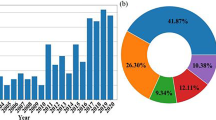Abstract
Finite element methods for acoustic wave propagation problems at higher frequency result in very large matrices due to the need to resolve the wave. This problem is made worse by discontinuous Galerkin methods that typically have more degrees of freedom than similar conforming methods. However hybridizable discontinuous Galerkin methods offer an attractive alternative because degrees of freedom in each triangle can be cheaply removed from the global computation and the method reduces to solving only for degrees of freedom on the skeleton of the mesh. In this paper we derive new error estimates for a hybridizable discontinuous Galerkin scheme applied to the Helmholtz equation. We also provide extensive numerical results that probe the optimality of these results. An interesting observation is that, after eliminating the internal element degrees of freedom, the condition number of the condensed hybridized system is seen to be almost independent of the wave number.
Similar content being viewed by others
References
Brenner, S.C., Scott, L.R.: The Mathematical Theory of Finite Element Methods, 3rd edn. Texts in Applied Mathematics, vol. 15. Springer, New York (2008)
Ciarlet, P.G.: The Finite Element Method for Elliptic Problems. Studies in Mathematics and Its Applications, vol. 4. North-Holland, Amsterdam (1978)
Cockburn, B., Dong, B., Guzman, J.: A superconvergent LDG-hybridizable Galerkin method for second-order elliptic problems. Math. Comput. 77, 1887–1916 (2008)
Cockburn, B., Gopalakrishnan, J., Lazarov, R.: Unified hybridization of discontinuous Galerkin, mixed, and continuous Galerkin methods for second order elliptic problems. SIAM J. Numer. Anal. 47(2), 1319–1365 (2009)
Cockburn, B., Guzman, J., Wang, H.: Superconvergent discontinuous Galerkin methods for second-order elliptic problems. Math. Comput. 78(265), 1–24 (2009)
Cockburn, B., Gopalakrishnan, J., Sayas, F.-J.: A projection-based error analysis of HDG methods. Math. Comput. 79(271), 1351–1367 (2010)
Grisvard, P.: Elliptic Problems in Nonsmooth Domains. Monographs and Studies in Mathematics, vol. 24. Pitman, London (1985)
Hiptmair, R., Moiola, A., Perugia, I.: Plane wave discontinuous Galerkin methods for the 2D Helmholtz equation: analysis of the p-version. SAM-ETH Zürich Report 2009-20 (2009)
Melenk, J.M., Sauter, S.: Convergence analysis for finite element discretizations of the Helmholtz equation with Dirichlet-to-Neumann boundary conditions. Math. Comput. 79, 1871–1914 (2010)
Schatz, A.H.: An observation concerning Ritz-Galerkin methods with indefinite bilinear forms. Math. Comput. 28, 959–962 (1974)
Stenberg, R.: Postprocessing schemes for some mixed finite elements. RAIRO. Anal. Numér. 25(1), 151–167 (1991)
Author information
Authors and Affiliations
Corresponding author
Rights and permissions
About this article
Cite this article
Griesmaier, R., Monk, P. Error Analysis for a Hybridizable Discontinuous Galerkin Method for the Helmholtz Equation. J Sci Comput 49, 291–310 (2011). https://doi.org/10.1007/s10915-011-9460-z
Received:
Revised:
Accepted:
Published:
Issue Date:
DOI: https://doi.org/10.1007/s10915-011-9460-z




